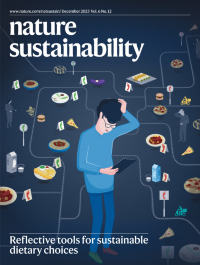Volume 6
-
No. 12 December 2023
Reflective tools for sustainable dietary choicesNudges can be useful tools to promote sustainable choices, but evidence about their effectiveness is mixed. Banerjee et al. show that reflective strategies enhance the ability of nudges to promote more sustainable diets.
See Banerjee et al.
-
No. 11 November 2023
Increasing exposure to wildfireThe destruction of homes and infrastructure by wildfires is on the rise, driven by changing climate and expanding development. Across the contiguous United States, Modaresi Rad et al. show that longer-lasting and more extreme wildfires are responsible for the majority of the increased exposure of settlements and infrastructure.
See Modaresi Rad et al.
-
No. 10 October 2023
The plastics conundrumPlastics waste (pictured) accumulates at an alarming rate in the natural environment, while managing such waste sustainably and effectively remains challenging. A selection of opinion pieces in this issue highlights some of the challenges and possible solutions.
See Editorial, Schröder, Chen, Ma and Lorek.
-
No. 9 September 2023
Effects of city-level transport policy portfoliosLittle is known about the likely effects of urban-scale policies for more sustainable transport. Across 120 cities worldwide, Liotta et al. analyse the environmental and welfare effects of four representative policies to mitigate greenhouse gas emissions from transport.
See Liotta et al.
-
No. 8 August 2023
Farm number and size trendThe number and size of farms have important social and environmental implications. Through a historical reconstruction of the number of farms on Earth over 1969–2013, Mehrabi shows that under current development trajectories the number of farms globally will likely halve by the end of the twenty-first century, with a doubling of the average farm size.
See Mehrabi
-
No. 7 July 2023
Advancing zinc batteries for market adoptionAqueous zinc batteries offer a more sustainable solution to the ever-growing energy storage demands. The hybrid electrolyte design proposed by Ji and colleagues raises the efficiency of the zinc metal anode to nearly 100% even under stringent conditions, getting this battery technology closer to practical applications.
See Jiang et al.
-
No. 6 June 2023
Mississippi Delta sediment crisisLand loss in the Mississippi Delta has been an ongoing issue over the past century, widely considered one of the foremost environmental disasters in the United States. Now research from Edmonds and colleagues unravels the anthropogenic drivers of regional wetland loss with direct implications for active mitigation measures.
See Edmonds et al.
-
No. 5 May 2023
Landscape-level conservation in IndiaBiodiversity conservation is crucial for promoting ecosystem services and human well-being, but often conservation efforts fail to protect most high priority zones. Srivathsa and colleagues show that safeguarding critical ecosystems in India (pictured) hinges on a mix of land sparing and land sharing.
See Srivathsa et al.
-
No. 4 April 2023
Smart building envelopes for reduced energy useBuildings account for about one-third of global energy consumption and one-quarter of carbon emissions. Hsu and colleagues show an electrochromic device for year-round thermal control of buildings, leading to substantial energy savings.
See Sui et al.
-
No. 3 March 2023
Impacts of reef tourismCoral reefs (pictured) attract tourists with their colourful biodiversity. Leveraging social media data and high-resolution coral maps, Lin and colleagues find that reef tourism supports local conservation, but at large concentrations can also harm reefs.
See Lin et al.
-
No. 2 February 2023
Shared-goals-led cooperation for sustainable resource usePeople who self-organize and display cooperative behaviour can avoid the overuse of common-pool resources. Tu and colleagues perform experiments through an online game platform to show that when users share common goals, they self-organize and cooperative behaviour emerges, leading to long-term resource sustainability.
See Tu et al.
-
No. 1 January 2023
Electronic waste potentialElectronic waste that is not properly disposed of can harm the environment, but, as a source of valuable materials such as the gold in the circuit board pictured, it could be beneficial if properly managed. Peng and Shehabi show the scale of the problem and assess the potential of diverse management solutions across the United States.
See Peng and Shehabi.












